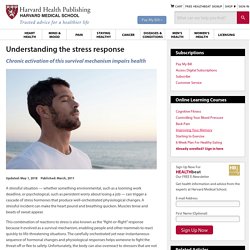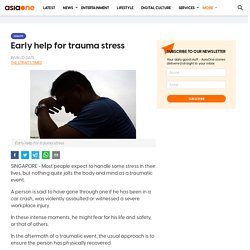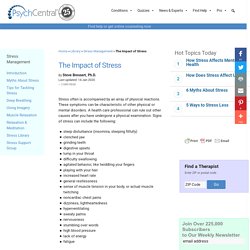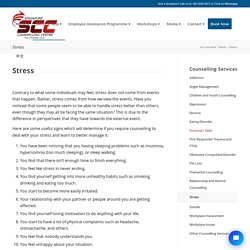

How does it affect us and what are some ways we can manage it? This short compilation seeks to answer these questions in a local context for the benefit of students and working adults. STRESS AND HEALTH: Psychological, Behavioral, and Biological Determinants. Understanding the stress response: Harvard Health Publishing. Chronic activation of this survival mechanism impairs health A stressful situation — whether something environmental, such as a looming work deadline, or psychological, such as persistent worry about losing a job — can trigger a cascade of stress hormones that produce well-orchestrated physiological changes.

A stressful incident can make the heart pound and breathing quicken. Muscles tense and beads of sweat appear. This combination of reactions to stress is also known as the "fight-or-flight" response because it evolved as a survival mechanism, enabling people and other mammals to react quickly to life-threatening situations. The carefully orchestrated yet near-instantaneous sequence of hormonal changes and physiological responses helps someone to fight the threat off or flee to safety. Over the years, researchers have learned not only how and why these reactions occur, but have also gained insight into the long-term effects chronic stress has on physical and psychological health.
Early help for trauma stress, Health News. SINGAPORE - Most people expect to handle some stress in their lives, but nothing quite jolts the body and mind as a traumatic event.

A person is said to have gone through one if he has been in a car crash, was violently assaulted or witnessed a severe workplace injury. In these intense moments, he might fear for his life and safety, or that of others. In the aftermath of a traumatic event, the usual approach is to ensure the person has physically recovered. But medical professionals here are increasingly paying attention to the mental well-being of such patients as well. At least two hospitals here routinely screen trauma victims for prolonged signs of stress. This debilitating condition impairs the social and occupational abilities of a person. Research has shown that in the first 12months after a serious injury, up to three in 10 patients will develop a psychiatric disorder such as PTSD, depression, anxiety and substance use disorders.
PISA 2015 Results (Volume III): Students' Well-Being. Causes of Stress in School. Cigna 360 Well-Being Survey 2019. Causes of Stress at Work. Untitled. Biological Effects on the Human Body. The Impact of Stress (Bressert S., PhD, for Psych Central) Stress often is accompanied by an array of physical reactions.

These symptoms can be characteristic of other physical or mental disorders. A health care professional can rule out other causes after you have undergone a physical examination. Signs of stress can include the following: mental slowness confusion general negative attitudes or thoughts constant worry your mind races at times difficulty concentrating forgetfulness difficulty thinking in a logical sequence the sense that life is overwhelming; you can’t problem-solve Emotional signs of stress include: irritation no sense of humor frustration jumpiness, overexcitability feeling overworked feeling overwhelmed sense of helplessness apathy Behavioral signs of stress include: decreased contact with family and friends poor work relations sense of loneliness decreased sex drive avoiding others and others avoid you because you’re cranky failing to set aside times for relaxation through activities such as hobbies, music, art or reading.
Conceptualization and Measurement of Coping During Adolescence: A Review of the Literature. Overcoming Stress - IMH. Everybody has it, and everybody talks about it, but nobody really knows what stress is.

WHY? It is because stress means different thing for each of us, and is also different for each of us. Manage your stress and become more productive rather than self-destructive. Stress is a part of modern living. It is unavoidable. Stress serves a purpose when it provides us with the motivation to scale new challenges or overcome difficulties. Prevalence Anybody who experiences changes in his or her life i.e., practically everybody. Stress can occur anytime. Symptoms / What to expect Physical: Aches & painsHeadachesFatigue/LethargyPalpitationStomach upsetsDizzinessSexual Dysfunction Emotional: Anxious/WorryTensedIrritable/JumpyDepressed/MoodyFeeling overwhelmedRestless Cognitive: ForgetfulnessPoor concentrationMental blockDifficulty in organizing & making decisions Behavioural: Sleep problemsCryingPoor appetiteFalling ill- cold, coughsWithdrawalSmoking/Drinking excessively Causes.
Stress - Counselling Services by Singapore Counselling Centre. Contrary to what some individuals may feel, stress does not come from events that happen.

Rather, stress comes from how we view the events. Have you noticed that some people seem to be able to handle stress better than others, even though they may all be facing the same situation? This is due to the difference in perspectives that they have towards the external event. Here are some useful signs which will determine if you require counselling to deal with your stress and learn to better manage it: If the signs describe how you feel, it shows that the stress you have been experiencing may be overwhelming and it is important to address it before it becomes more severe. Take a step of faith towards taking control of your situation. Contrary to what some individuals may feel, stress does not come from events that happen.